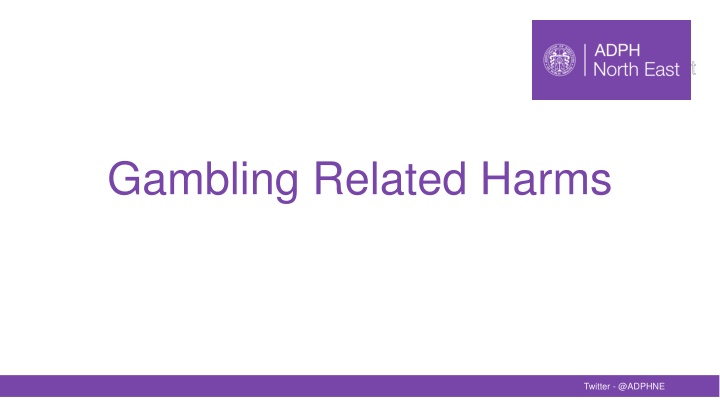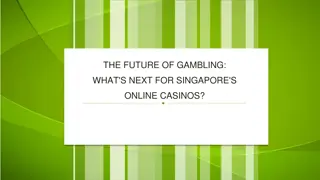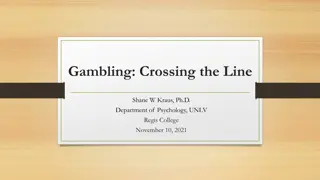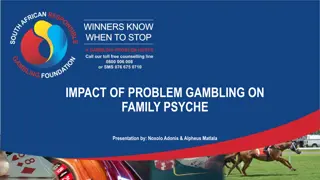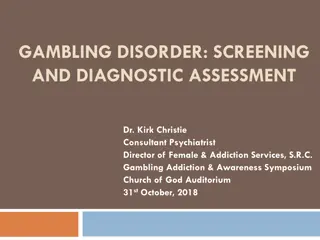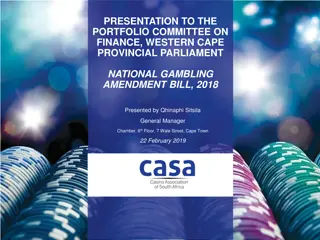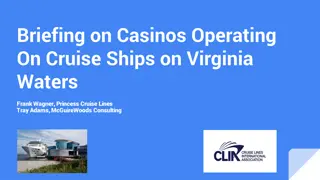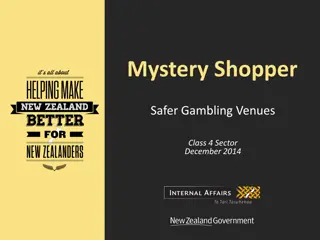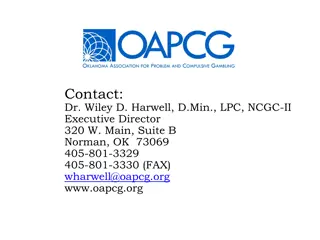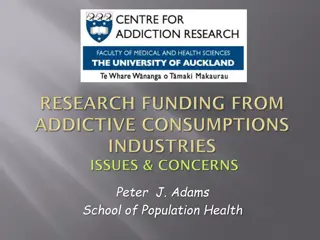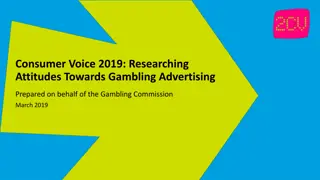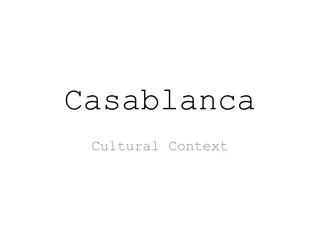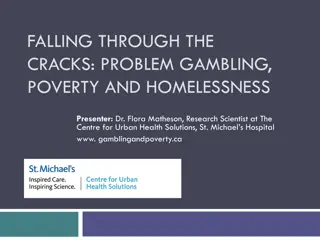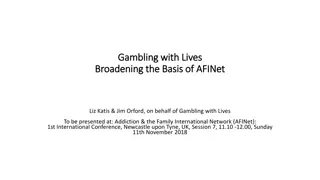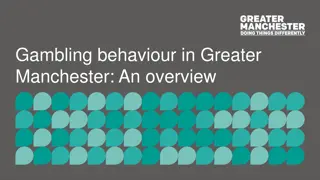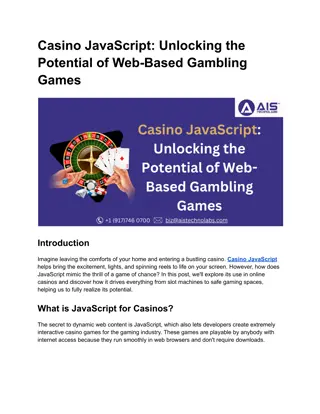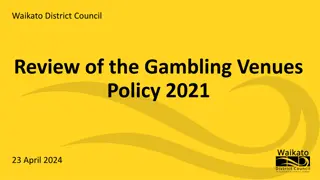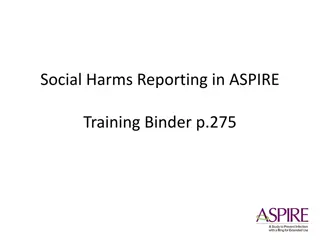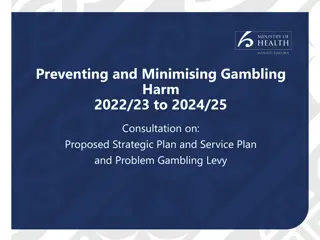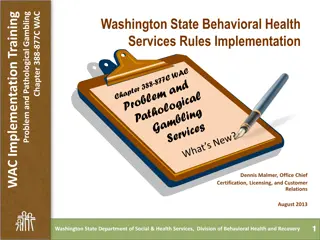Gambling-Related Harms in the North East
Gambling involves staking money on chance outcomes, leading to potential harms like addiction and financial difficulty. Language choices matter when addressing individuals affected by gambling, focusing on support and understanding rather than stigma. Symptoms of gambling addiction include chasing losses, lying, guilt, and financial distress. In the North East of England, a significant portion of the population is classified as being at risk of harm from gambling, highlighting the need for awareness and support.
Download Presentation

Please find below an Image/Link to download the presentation.
The content on the website is provided AS IS for your information and personal use only. It may not be sold, licensed, or shared on other websites without obtaining consent from the author.If you encounter any issues during the download, it is possible that the publisher has removed the file from their server.
You are allowed to download the files provided on this website for personal or commercial use, subject to the condition that they are used lawfully. All files are the property of their respective owners.
The content on the website is provided AS IS for your information and personal use only. It may not be sold, licensed, or shared on other websites without obtaining consent from the author.
E N D
Presentation Transcript
Gambling Related Harms Twitter - @ADPHNE
What is gambling? Gambling is staking money, or something of value, on the outcome of something involving chance (Lostutter, et al., 2013). It can include the following: Arcades Betting (online, at an event or in a high street bookmakers) Bingo (online or in a bingo hall) Casino (online or in a casino) Lotteries (raffles, tombolas, sweepstakes etc) Gaming machines (fruit machines, fixed odds betting terminals)
Where does gambling happen? The gambling industry is represented in different forms. The industry is split by land-based gambling activity and online/remote gambling activity. Land-based gambling includes betting shops, arcades, bingo halls and casinos. Most recently, there were 8,301 gambling premises in Great Britain (April 2022 March 2023). The gross gambling yield for the land-based gambling sector was 4.5 billion for the same time period. Remote gambling includes the online casino, betting and bingo sector. The number of active accounts for remote gambling is 36.4 million (April 2022 March 2023). The gross gambling yield for remote gambling was 6.5 billion for the same time period. (The Gambling Commission, 2024) Twitter - @ADPHNE
Language matters It is important to support the whole person and not just their condition . Therefore, it is important to make language choices that do not embed the negative stigmas further. Instead of problem gambler, which can imply that the individual is solely responsible for their gambling, try using: person experiencing gambling harms person being harmed by gambling a person living with a gambling addiction person in recovery from a gambling addiction
Symptoms of someone experiencing gambling addiction Gambling on another day to try and win back the money lost chasing losses Lying to conceal the extent and amount gambled Feelings of guilt and gambling when feeling distressed Gambling more than one can afford to lose Gambling with large amounts of money to get the same feeling of excitement Repeated unsuccessful attempts to cut back or stop gambling Feelings of anger when losing money through gambling Borrowing money to gamble (Royal College of Psychiatrists, 2023)
Gambling harms in the North East In England it is estimated that 3.8% of the population are classified as gambling at elevated risks. In the North East, it is estimated that 4.9% of the population (aged 16+) are at-risk gamblers, where they experience some level of negative consequences due to gambling. This is the highest regional estimated prevalence of at-risk gambling in England. (OHID, 2023) Further impacts on affected others can be challenging to measure, but they too experience gambling related harms. Twitter - @ADPHNE
Gambling harms and the commercial determinants of health The 2005 Gambling Act made an industry favourable environment, with light touch regulation (Cassidy, 2020). Current regulation fails to protect people from harmful products and practices of the gambling industry (van Schalkwyk, et al., 2023). Responsible gambling is often coined by industry which blames problem people rather than a problem industry (Miller & Thomas, 2018). The gambling industry is able to cast doubt on gambling related harms and create entire knowledge gaps. Harm is often dismissed because industry fund research, education and treatment. Twitter - @ADPHNE
Highly profitable products Gambling sits alongside other industries selling highly profitable but harmful products, such as tobacco and alcohol. Great Britain s gambling industry had a total gross gambling yield of 15.1 billion from April 2022 to March 2023 (Gambling Commission, 2023). Current discourse emphasises the 3billion paid to His Majesty s Treasury annually, however the gambling industry has been noted to not create wealth, rather it redistributes from the deprived and vulnerable to the very rich, by extracting money from its customers (Markham and Young, 2015). The business model is built on increasing the amount of money that customers lose through tactics to get people to start and continue gambling. 86% of gross online betting profits come from just 5% of customers (Chapter One, 2022). Twitter - @ADPHNE
Harmful gambling or harmful gambling products? All forms of gambling carry a level of risk and can be harmful. Industry invest in research to design games to be addictive as possible to maximise profits. Gambling formats such as online slots and online casino games are an example of this. The following elements of design increase the addictive nature of these gambling forms: - Speed of play, some games can be played every 2.5 seconds - Stake sizes, many online games have unlimited stake sizes, higher stake limits are linked to higher rates of harm - Losses disguised as wins, these are designed to impact the brain s reward function - Near misses, creating a feeling that a win was close, encouraging further play - Misrepresenting random results, whereby games are designed to convince the person gambling to believe they can guess the outcome of the random event. (Chapter One, 2023). Twitter - @ADPHNE
Gambling is all around us Online gambling is available 24 hours a day. The five largest online betting operators in the UK send an average of 78 tweets per day and a study from 2021 found that 63.3% of adults (over 25) reported seeing gambling ads on social media at least once a week, this was 72.4% for 18-24 year olds (Rossi et al., 2022) Direct marketing can be sent through text, apps or emails, often offering free spins. Data shows people suffering harm are 9 times more likely to be offered free bets than people who are not, and those people receive an average pf 7 offers a week (Chapter One, 2023). It is estimated that a gambling logo is shown every 10 seconds during a football match (GMCA, 2023). All of this advertising and marketing can make it even harder to avoid or recover from gambling harms. Twitter - @ADPHNE
How gambling affects the brain Industry design gambling forms to be addictive for the brain: A gambling win releases a feel-good chemical in the brain called dopamine. Frequent gambling means the brain gets used to the dopamine, making the winning feeling difficult to achieve. Some gambling products, like roulette, make the player feel they are winning, even when they re not, encouraging the gambler to keep playing to reach the winning feeling. Dr Jared Cooney Horvath, Neuroscientist, University of Melbourne
Young People and Gambling An estimated 55,000 children aged 11-16 in the UK are addicted to gambling (House of Lords, 2021). 26% of 11-17 year olds had spent their own money on some form of gambling activity in 2023 (Gambling Commission, 2023). Early gambling exposure is a risk factor for being impacted by gambling harms. Playing games that combine gambling and gaming is associated with increased risk for youth (Stark, Reynolds & Wiebe, 2021). Approximately 80% of students have participated in gambling, with nearly half doing so to make money (YGAM, 2023). Twitter - @ADPHNE
Gambling and Gaming There are many links between gaming and gambling, which inadvertently expose children and young people to gambling practices. Examples of these include: Skins Decorative virtual weapons, equipment or characters acquired in a game. Skins can be sold for real money on third party sites and can be used to place bets on e-sports and casino style games. Loot boxes A virtual box contains random items such as a rare skin. People who are spending more on loot boxes are more likely to migrate or initiate gambling (Brooks & Clark, 2019). People buying loot boxes had more severe problem video gaming and increased risks of gambling harms (Li, Mills & Nower, 2019). Card packs Contain randomised in game items that are not visible to the player before they are opened. They can be purchased by in-game currency. Twitter - @ADPHNE
Gambling Related Harms Gambling harms are any negative consequence or side effect experienced as a result of gambling. Gambling related harms are not only felt by the person who gambles but also affected others such as family and friends. (Greater Manchester Combined Authority, 2022) Twitter - @ADPHNE
Gambling harm risk factors Anyone can be harmed by gambling; however harms are not evenly distributed. People living in deprived communities are seven times more likely to experience gambling related harms (OHID, 2023). There is a higher prevalence of gambling disorder among people who are in contact with the criminal justice system. Military veterans are ten times more likely to experience a gambling disorder or addiction (Harris, et al., 2023). Men are more likely to have gamble at harmful levels than women (OHID, 2023). Gambling disorder rates are higher in young people than in the general population (OHID, 2023). Those who have a parent who gambles at harmful levels are more likely to gamble at these levels too.
The continuum of gambling harm The most commonly used scale to measure gambling harm severity is the Problem Gambling Severity Index, or PGSI. NICE have endorsed PGSI as part of their Harmful gambling: identification, assessment and management recommendations. It has four categories: Low-risk gambling behaviour Moderate-risk gambling behaviour Problem & pathological gambling Non-risk gambling A person may transition between stages, over a long period of time or rapidly at a crisis point. Harms can be experienced episodically or chronically and can have generational and intergenerational harm (Langham, et al., 2016).
The scope of harms Education and employment Crime and anti-social behaviour Mental Health and Wellbeing Financial Relationships Cultural For many, gambling related harms leave a legacy and may be experienced for many years after the event (Langham, et al., 2016). Twitter - @ADPHNE
Mental health and wellbeing harms Suicide and suicide ideation People with a diagnosed gambling disorder have a 1.8x higher rate of mortality (Karlsson & Hakansson , 2018). There are over 400 gambling related suicides every year in the UK (PHE, 2021). Depression and anxiety In England, it is estimated that there are 69,099 people with depression associated with moderate- risk and problem gambling (OHID, 2023). There are links that depression can lead someone to gamble and depression can also be a consequence of gambling at harmful levels. Stress, sleep deprivation and exhaustion Close to 50% of people with gambling problems endorse loss of sleep due to stress or worry about gambling (Buchanan et al., 2020) Links to substance misuse People who regularly consume more alcohol than the recommended weekly intake are 2.2x more likely to experience harmful gambling (PHE, 2021).
Comorbidities Gambling harm is a complex issue that often occurs alongside: Mental ill-health Use of tobacco Alcohol and illicit drug use The heaviest drinkers (over 50 units per week) are 7.8x more likely to experience harmful gambling (PHE, 2021). There are an estimated 1,312 people aged 16-24 who use illicit opiates and or crack cocaine associated with at-risk and problem gambling in England (OHID,2023). Family and relationship conflict Various forms of trauma.
Suicide risk There is an established link between gambling addiction and suicide attempts and ideation. It is estimated that between 240 and 700 people take their own life every year in England related to gambling. (PHE,2021) It is likely that gambling related harms will have been one of many factors contributing to death by suicide. Studies of young people show people (aged 16 and 24) who have experienced gambling addiction found men were 9x and women 5x more likely to attempt suicide than those who have not experienced any problems with their gambling (Wardle & McManus, 2021).
Financial harms Many people experiencing gambling related harms are also from backgrounds of socioeconomic disadvantage and therefore financial harms can be extreme (Rintoul, et al., 2012). Debts and financial hardship Financial difficulties and debt experienced by gamblers and affected others is often severe. These can often impact the children of gamblers. Asset losses Several studies report that gambling leads to housing problems including homelessness. Bankruptcy Studies have shown links between an increase in the number of electronic gaming venues in a local area increased the number of personal bankruptcies in that area (OHID, 2023) Twitter - @ADPHNE
Relationship harms can include Relationship breakdown Relationships can be strained as a result of financial difficulties and the dishonesty or loss of trust caused by the person who gambles hiding their behaviour (Banks, et al., 2018). Violence and domestic abuse Studies have identified an increased risk of intimate partner violence among people experiencing gambling disorder or addiction (Dowling, et al., 2016). Impact on children Studies have reported that adult gamblers can neglect their duties to their children such as failing to provide food or collect them from school (PHE,2021). These adverse childhood experiences can lead to elevated risk experiencing poor health and social outcomes across the life course.
Employment and educational harms Unemployment Gambling is associated with higher risk or future unemployment in the UK (Muggleton, N et al., 2021) There is an estimated 22,932 unemployment benefit claims associated with gambling related harms(OHID, 2023) Absenteeism There are links between absenteeism for both gamblers from their place of work and education, as well as the children of gamblers whose education can suffer as a consequence. Under-performance Instability at home which can come as a consequence of gambling harms can impact a child s performance at school. Twitter - @ADPHNE
Cultural harms Stigma Stigmatizing attitudes towards those experiencing gambling related harms are based on the belief that gambling is a choice that is entirely under the individual s control (Blaszczynski et al. 2011) Shame Blame and shame are linked to gambling severity (Estevez et al., 2022) Isolation and exclusion Public stigma for both the person experiencing gambling related harm and affected others can create isolation, risk of status loss, social exclusion and discrimination (Takiguchi et al., 2022) It is currently unclear how gambling related harms are felt in different communities, but stigma and shame may be felt more extremely in some environments than others.
Criminal and anti-social behaviours Gambling at harmful levels has been linked to threatening behaviour, damage to property, fraud and theft. Additionally, there is a strong association between gambling harms and people within the criminal justice system. Research indicates that 5.4% of male and 3% of female prisoners believing that their current sentence was linked to gambling (May-Chahal, et al., 2015).
Supporting those experiencing gambling related harms
Conversations can be difficult There is a lot of stigma surrounding gambling harm. Many people can be reluctant to have conversations about their gambling harms for various reasons including: Shame and embarrassment A lack of hope that they can change Fear of judgement Failure to recognise gambling as the main issue They may not feel able or ready to tackle the issue. Twitter - @ADPHNE
Tools to support gambling related harm conversations & interventions A language guide has been produced collaboratively with the Greater Manchester and Yorkshire and the Humber regional gambling related harm teams. Words can hurt Language guide for gambling harms | North East (adph.org.uk) A King s College London guide and study on the questions local authorities should ask surrounding gambling in adult social care settings. Guidance_for_ASC_staff_identifying_and_supporting_people_affected_by_Gambling_Harms.pdf (kcl.ac.uk) The MECC Gambling Harms page has been updated with conversation starter prompts, information about advice and services available in the North East. MECC | Service (meccgateway.co.uk) ADPH Y&H have produced a public health framework for gambling harm reduction, with much of their work aimed at local authorities, where you can find insight on how to influence the wider gambling harms environment. public-health-framework-for-gambling-related-harm-reduction-sept-2019.pdf (yhphnetwork.co.uk) Twitter - @ADPHNE
Services available in the North East NHS Northern Gambling Clinic The Northern Gambling Clinic provides specialist addiction therapy and recovery to people affected by gambling addiction Telephone: 0300 300 1490 Email: referral.ngs@nhs.net Address: Regus, 30 Cloth Market, Newcastle upon Tyne, NE1 1EE ng.northeast@neca.co.uk NECA NECA provide gambling advice and gambling support methods to help those experiencing harms to alter behaviours. Telephone: 0191 562 3309 Email: gambling.northeast@neca.co.uk ng.northeast@neca.co.uk GamFam GamFam provide support for affected others online. They are a registered charity and can be accessed via: www.gamfam.org.uk ng.northeast@neca.co.uk Chapter One This is an online resource that helps to raise awareness of gambling harms and how and where to get help. They are a resource for everyone affected by gambling and can be accessed via: www.chapter-one.org National Helpline Telephone: 0808 8020 133 This is open 24/7 For more information on each of these options and more, please go to MECC | MECC | Service (meccgateway.co.uk) MECC | Service (meccgateway.co.uk) Service (meccgateway.co.uk) Twitter - @ADPHNE
Blocking and exclusion tools available Self exclusion from online gambling To self exclude from an online gambling company, each company needs to be contacted through the responsible gambling pages of the website or through the Remote Gambling Association. Betting Shops Licensed betting shops all operate exclusion schemes. Exclusion lasts for 12 months and can be done in person or via MOSES (multi operator self exclusion scheme). Blocking gambling transactions through the bank Many UK banks provide free tools to block transactions categorized as gambling. These can be applied to each bank card. GAMSTOP GAMSTOP is a free service that will block opening or accessing gambling accounts in the person s name with all licensed online UK gambling companies. Sign up can be for 6 months, 1 year or 5 years. For more information on each of these options and more, please go to MECC | Service MECC | Service (meccgateway.co.uk) MECC | Service (meccgateway.co.uk) (meccgateway.co.uk) Twitter - @ADPHNE
First steps to take in your local authority Conduct a health needs assessment Collaborate with colleagues across your local authority Update your website to signpost clearly to gambling harms support services Create a steering group for gambling harms in your local authority Build your Action Plan Engage with lived experience Attend the regional network Twitter - @ADPHNE
Please take a couple of minutes to fill out the following feedback form via the QR code below.
References American Psychiatric Association, 2013. Diagnostic and statistical manual of mental disorders. 5th ed. Arlington VA: s.n. Banks, J. et al., 2018. Families Living with Problem Gambling: Impacts, Coping Strategies and Help-Seeking, Sheffield: Sheffield Hallam University. Blaszczynski, A. et al., 2011. Responsible Gambling: General Principles and Minimal Requirements. Journal of Gambling Studies, Volume 27, pp. 565-573. Brooks, G. & Clark, L., 2019. Associations between loot box use, problematic gambling and gambling, and gambling-related cognitions.. Addictive Behaviors, Volume 96, pp. 26-34. Buchanan, T., McMullin, S., Baxley, C. & Weinstock, J., 2020. Stress and gambling. Current Opinion in Behavioural Sciences, Volume 31, pp. 8-12. Cassidy, R., 2020. Vicious Games: Capitalism and Gambling. London: Pluto Press. Chapter One, 2023. It's the products not the people. [Online] Available at: https://www.chapter-one.org/about-gambling/the-myth-of-safer-gambling [Accessed November 2023]. Dowling, N. et al., 2016. Problem Gambling and Intimate Partner Violence: A systematic review and meta-analysis. Trauma Violence Abuse, 17(1), pp. 43-61. Estevez, A., Momene, J., Jauregui, P. & Etxaburu, N., 2022. Shame and Blame in Gambling: Relationship with Emotion Regulation and Gambling Motives. International Journal of Mental Health and Addiction. Gambling-Commission, 2023. Young People and Gambling 2023. [Online] Available at: https://www.gamblingcommission.gov.uk/statistics-and-research/publication/industry-statistics-february-2024-correction [Accessed March 2024]. Gambling-Commission, 2024. Industry Statistics. [Online] Available at: https://www.gamblingcommission.gov.uk/statistics-and-research/publication/industry-statistics-february-2024-correction [Accessed March 2024]. Greater Manchester Combined Authority, 2022. Gambling Harms in Greater Manchester - Strategic Needs Assessment, Manchester: s.n. Harris, S., Pockett, R. & Dighton, G., 2023. Social and economic costs of gambling problems and related harm among UK military veterans. BMJ Mil Health, 169(5), pp. 413-418. House of Lords, 2021. Gambling Harm - Time for Action, s.l.: Authority of the House of Lords. Karlsson, A. & Hakansson , A., 2018. Gambling disorder, increased mortality, suicidality, and associated comorbidity: A longitudinal nationwide register study. Behav Addict, 7(4), pp. 1091-9. Langham, E. et al., 2016. Understanding gambling related harm: a proposed defintion, conceptual framework, and taxonomy of harms. BMC Public Health, 27(16), p. 80. Li, W., Mills, D. & Nower, L., 2019. The relationship of loot box purchases to problem video gaming and problem gambling. Addictive Behaviors, Volume 97, pp. 27-34. Livazovic, G. & Bojcic, K., 2019. Problem gambling in adolescents: what are the psychological, social and financial consequences?. BMC Psychiatry, 19(1), pp. 1-15. Lostutter, T. W., Holmes, J. K. & Larimer, M. E., 2013. Chapter 89 - College Student Gambling: Etiology, Consequences, and Prevention Strategies. In: P. M. Miller, ed. Interventions for Addiction. s.l.:Academic Press, pp. 883-892. Markham, F. & Young, M., 2015. "Big Gambling": The rise of the global industry-state gambling complex. Addiction Research & Theory, 23(1), pp. 1-4. May-Chahal, C., Clifton, A., Anderson, J. & Humphreys, L., 2015. The OffGam Pilot: Towards the Development of Gambling Awareness and Problem Gambling interventions in English Prisons, Lancashire: Lancashire University. Miller, H. & Thomas, S., 2018. The problem with 'responsible gambling': impact of government and industry discourses on feelings of felt and enacted stigma in people who experience harms with gambling. Addiction Research & Theory, 26(2), pp. 85-94. Muggleton, N. et al., 2021. The association between gambling and financial, social and health outcomes in big financial data. Nature Human Behaviour, Volume 5, pp. 319-326. Office for Health Improvement and Disparities, 2023. The economic and social cost of harms associated with gambling in England, s.l.: GOV.UK. Public Health England, 2021. Gambling-related harms:evidence review, s.l.: GOV.UK. Rintoul, A., Livingstone, C. & Mellor, A., 2012. Modelling Vulnerability to Gambling Related Harm: How Disadvantage Predicts Gambling Losses. Addiction Research & Theory, 21(4). Rossi, R. & Nairn, A., 2022. New Developments in Gambling Marketing: the Rise of Social Media Ads and Its Effect on Youth. Current Addiction Reports, Volume 9, pp. 385-391. Royal College of Psychiatrists, 2023. Gambling Disorder. [Online] Available at: https://www.rcpsych.ac.uk/mental-health/mental-illnesses-and-mental-health-problems/gambling-disorder [Accessed 12 November 2023]. Stark, S., Reynolds, J. & Wiebe, J., 2021. Gambling and Gaming in an Ontario Sample of Youth and Parents. Journal of Gambling Issues, Volume 46. Takiguchi, N., Kawanishi, Y. & Samuelsson, E., 2022. Secrecy, self-blame and risks for social exclusion - Family members' experiences of gambling problems in Japan. Frontiers in Psychiatry, Volume 13. van Schalkwyk, M. C., Cassidy, R., Blythe, J. & Ovenden, N., 2023. Health Above Profits - We Need a New Gambling Act. [Online] Available at: https://www.researchgate.net/publication/371189412_Health_Above_Profits_-_We_Need_a_New_Gambling_Act [Accessed November 2023]. Wardle, H. & McManus, S., 2021. Suicidality and gambling among young adults in Great Britain: results from a cross-sectional online survey. Lancet Public Health, 6(1), pp. 39-49. YGAM, 2023. Annual Student Gambling Survey, UK: s.n.
